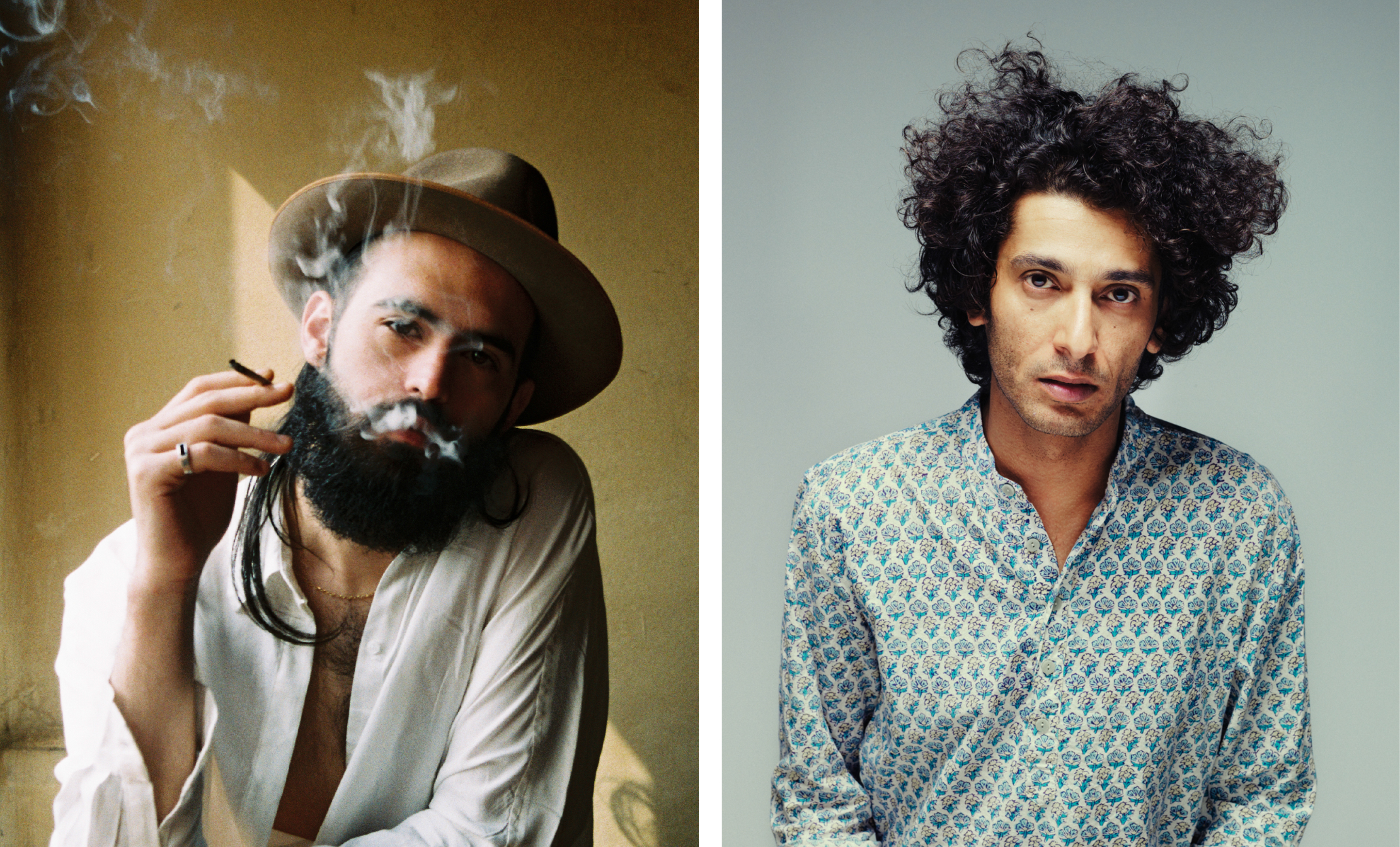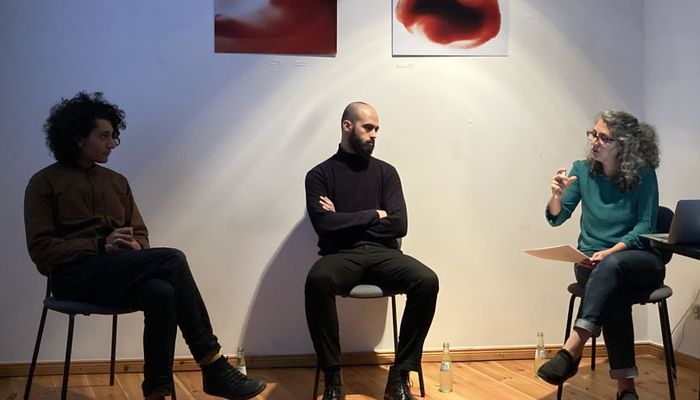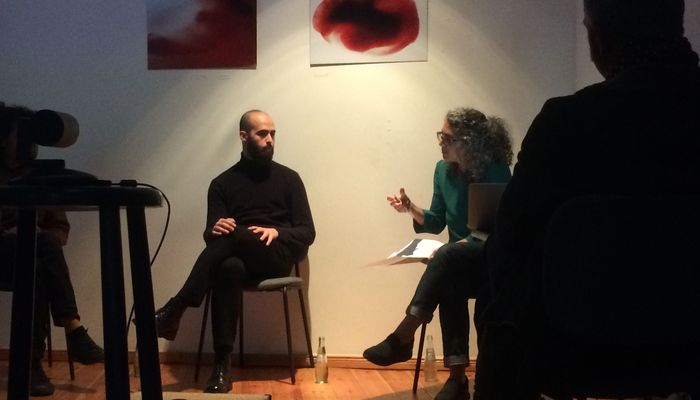In times of upheaval, marked by revolution and dreams of better days, political failures and increased societal engagement, pandemic and depression, exile and the search for a refuge there is an ongoing search in the Arab world for a new language and sound that emancipates and not oppresses, that connects and not divides. In her conversation with the European-based Musicians, Khyam Allami and Milad Khawam, Diana Abbani aims to discuss the motivation, situation, reactions, and role of music in times of crisis. Questions will relate to loss, time, purpose, and audiences, to new encounters, relations and reflections, to the question of audio-memory, as well as to Berlin’s role in the current Arabic music production in such circumstances.
Making Arabic Music in Times of Upheaval
Musicians Khyam Allami and Milad Khawam in conversation with Diana Abbani (EUME Fellow of the Fritz Thyssen Foundation 2020/21)
In cooperation with AL.Berlin and Bulbul Berlin

Khyam Allami (born in Damascus 1981) is an Iraqi-British multi-instrumentalist musician, composer, researcher and founder of Nawa Recordings. Primarily a performer of the Oud, his artistic research focuses on the development of contemporary and experimental repertoire based on the fundamentals of Arabic music, with a focus on tuning and microtonality. He has composed works for film, theatre and dance including the award winning As I Open My Eyes by Leyla Bouzid (2016), All This Victory by Ahmad Ghossein (2019) and A Universe not Made for Us (2019), a collaboration with contemporary Flamenco dancer/choreographer Yalda Younes. His recent commissions include Requiem for the 21st Century, an immersive Oud-based installation for Opera North (Leeds, UK), and an upcoming string quartet for JACK quartet (NYC, USA). He holds a BA and Masters in Ethnomusicology from SOAS, University of London and is currently completing an M4C/AHRC funded PhD in composition at the Royal Birmingham Conservatoire, Birmingham City University. He lives and works between London, Berlin and Beirut.
▶ Khyam Allami: “Al-Mayasan”
Milad Khawam is a Trumpet player, Producer & Composer. Hailing from Damascus, where he studied classical and Arabic music at the opera house in Damascus, he is now based in Berlin. Khawam played principal Trumpet with many orchestras between Europe and the Middle East since 2010. He has also been a featured soloist in various groups, performing at Morgenland-fest 2016. In 2017, he composed original soundtrack for “No Monsters in Berlin“, a short film which won the Grand Jury prize of Diversity in Cannes Short Film Showcase. Khawam’s compositions have been performed at many festivals such as Xjazz-fest Berlin 2018 and Fusion 2018. A featured soloist in the Jazzaar global ensemble in Switzerland 2019, Khawam shared the stage with the likes of acclaimed drummer Billy Cobham. He was commissioned to compose and perform a music piece related to an object from the abbasid era called “Aquamanile” for the Museum of Islamic Art in a collaboration with Piranha records in Berlin 2019. Khawam also produces electronic music and can often be found performing solo. He was also a participant at CTM-Festival 2020. Milad’s debut album release “To The West” was in May 2020 on XJAZZ Music Berlin. “To The West” was composed & Produced by Milad Khawam with the support of Ettijahat – Independent Culture and the Goethe-Institut. Khawam was commissioned to compose the music for a podcast production “Wir Machen Das” in cooperation with rbb in 2020.
▶ Milad Khawam: “To The West”
Diana Abbani received her doctorate in Arabic Studies from Sorbonne University with a thesis entitled “Music and Society in Beirut at the Time of the Nahda”. She holds double masters in History and Political Science from Sorbonne University and the University of Saint Denis in Paris. She is currently preparing a book that focuses on the Levant’s social history in the first half of the 20th century. In her research, she examines the implications of social, political and technological changes, as well as the emergence of the music industry and the entertainment world, on music and Levantine society. In her study, she focuses on alternative narratives, uncovering the forgotten stories of people who were affected by the sound transition and revisiting the experiences of those marginalized by official narratives. Diana was a EUME Fellow during the academic years 2018/19 and 2019/20. In the academic year 2020/21, Diana is a EUME Fellow of the Fritz Thyssen Foundation. She is associated with the Friedrich Schlegel Graduate School of Literary Studies at Freie Universität Berlin.
The conversation will take place at Bulbul Berlin. An on-site attendance will be available only for a limited number of pre-registered participants. The conversation will be broadcasted via Zoom. Please register in advance via eume(at)trafo-berlin.de to receive the login details. Depending on approval by the speakers, the Berliner Seminar will be recorded. All audio recordings of the Berliner Seminar are available via the account of the Forum Transregionale Studien on Soundcloud.


